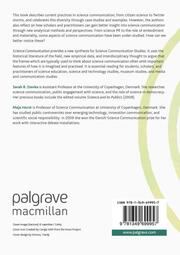Detailansicht
Science Communication
Culture, Identity and Citizenship
ISBN/EAN: 9781349699957
Umbreit-Nr.: 632445
Sprache:
Englisch
Umfang: viii, 266 S., 1 farbige Illustr., 266 p. 1 illus.
Format in cm:
Einband:
kartoniertes Buch
Erschienen am 01.10.2016
Auflage: 1/2021
- Zusatztext
- This book describes current practices in science communication, from citizen science to Twitter storms, and celebrates this diversity through case studies and examples. However, the authors also reflect on how scholars and practitioners can gain better insight into science communication through new analytical methods and perspectives. From science PR to the role of embodiment and materiality, some aspects of science communication have been under-studied. How can we better notice these? Science Communication provides a new synthesis for Science Communication Studies. It uses the historical literature of the field, new empirical data, and interdisciplinary thought to argue that the frames which are typically used to think about science communication often omit important features of how it is imagined and practised. It is essential reading for students, scholars, and practitioners of science education, science and technology studies, museum studies, and media and communication studies.
- Kurztext
- This book describes current practices in science communication, from citizen science to Twitter storms, and celebrates this diversity through case studies and examples. However, the authors also reflect on how scholars and practitioners can gain better insight into science communication through new analytical methods and perspectives. From science PR to the role of embodiment and materiality, some aspects of science communication have been under-studied. How can we better notice these? Science Communication provides a new synthesis for Science Communication Studies. It uses the historical literature of the field, new empirical data, and interdisciplinary thought to argue that the frames which are typically used to think about science communication often omit important features of how it is imagined and practised. It is essential reading for students, scholars, and practitioners of science education, science and technology studies, museum studies, and media and communication studies.
- Autorenportrait
- Sarah R. Davies is Assistant Professor at the University of Copenhagen, Denmark. She researches science communication, public engagement with science, and the role of science in democracy. Her previous books include the edited volume Science and its Publics (2008). Maja Horst is Professor of Science Communication at University of Copenhagen, Denmark. She has studied public controversies over emerging technology, innovation communication, and scientific social responsibility. In 2009 she won the Danish Science Communication prize for her work with interactive debate installations.
